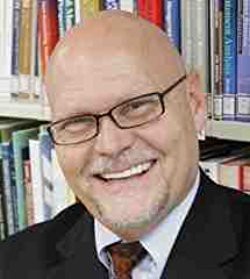
John Beck
Professor of Geriatrics
Dr. John Beck was a distinguished academic who contributed enormously to the development of medical institutions in Canada, the USA, Israel, and countries in Africa and Southeast Asia. The international reputation of the Royal Victoria Hospital and McGill University in Montreal, Canada; the University of California, Los Angeles, School of Medicine, USA; and Ben-Gurion University of the Negev, Israel, are in part a reflection of his vision and leadership. At the time of his death, he was an Emeritus Professor of Medicine at the David Geffen School of Medicine, University of California, Los Angeles.
Dr. Beck's contributions have affected many aspects of medicine. In fact, independent observers of his professional activities have concluded that he has had five interconnected yet distinct careers. This followed from his conviction of establishing a clear vision of his objectives and evaluating these at five-year intervals. He believed strongly that if these objectives were not met in two five-year periods, it was time to move on. He also continually sought the excitement of new intellectual challenges.
Born in Audubon, Iowa in 1924, Dr. Beck received his BSc., MSc., Diploma in Medicine, and M.D.C.M. degrees at McGill University in Montreal, Canada, winning the coveted Holmes Gold Medal for the most outstanding performance in his class upon graduating from the Faculty of Medicine. He served in the Canadian armed forces during World War II, rising from a private to a commissioned officer and company commander during this time.
Following graduation, he pursued clinical and research training at the Royal Victoria Hospital in Montreal, the Cleveland Clinic, Tufts New England Medical Center in Boston, Ringshospatalet (University Hospital) and the Carlsberg Institute in Copenhagen, and University College Hospital Medical School in London. This background led to his pioneering work in basic and clinical endocrine research on the pituitary and adrenal glands, hormonal changes in pregnancy, the gastrointestinal hormones influencing pancreatic endocrine function and the hormonal control of adipose tissue metabolism.
Dr. Beck's second career began in 1964, when he was appointed Physician-in-Chief at the Royal Victoria Hospital and Chairman of the Department of Medicine at McGill University. Much of his energy at that time turned to undergraduate medical education, residency and fellowship training and advanced training for physicians, primarily destined for academic and leadership roles in Canada, the USA, and Commonwealth countries, particularly Australia, Kenya, and Singapore.
Dr. Beck's third career began its formulation during his tenure as departmental chairman at McGill and his role as Physician-in-chief in the Department of Medicine at the Royal Victoria Hospital in Montreal. At this time, he became concerned about the fragmentation of medicine, the social responsibility of the various professional organizations, the role of primary care in the delivery of health services, health and social care of the elderly, physician and other health professional workforce issues and the training of non-bench physician scientists. In view of his leadership in the pilot Clinical Scholars Program sponsored by the Carnegie Corporation and the Commonwealth Fund of New York, an opportunity presented itself when the emerging Robert Wood Johnson Foundation decided to support an ongoing national Clinical Scholars Program. Dr. Beck was appointed the first national director of this program and served as a senior consultant to the Robert Wood Johnson Foundation during its transition from a local foundation to a national one. The Clinical Scholars Program became one of the Foundation's flagship programs and is one of the most prestigious fellowships awarded to physicians in the USA. Clinical Scholars continue to conduct innovative research under supervision of faculty from a selected group of Academic Medical Centers.
While in Los Angeles, Dr. Beck and his colleagues built one of the earliest and strongest programs in geriatric medicine in the USA, his fourth career. Dr. Beck became Director of UCLA's MultiCampus Division of Geriatric Medicine, where he remained for ten years, his fifth career. When Dr. Beck left to pursue other activities, UCLA's Division of Geriatrics was deemed to be the best in the USA.
From 1993 to 2014 alone he published over 200 peer-reviewed papers and was the recipient of numerous awards. They include a Ph.D. (honoris causa) from Ben-Gurion University of the Negev and a D.Sc. (honoris causa) from McGill University. In addition, he was awarded a Mastership from the American College of Physicians, the Milo F. Leavitt Memorial Award from the American Geriatrics Society, and the Duncan Graham Award of the Royal College of Physicians and Surgeons (Canada). Dr. Beck was a member of the National Academy of Medicine, a Fellow of the Royal Society of Canada, and a Fellow of the American Association for the Advancement of Science. The American College of Physicians-American Society of Internal Medicine conferred the Philip's Award, a lifetime award for Clinical Excellence, on him.
In 1979 he relocated to Los Angeles because of his loving partnership with Arlene Fink, a Professor of Medicine and Public Health at UCLA. He and Arlene built an extraordinary life of work, charity and travel. Their home in Pacific Palisades, which overlooks the Pacific Ocean and the Santa Monica Mountains, was a sanctuary for both.
Dr. Beck is survived by the wife he adored, Arlene Fink; a son, Philip Beck; a sister, Ellen McLean; and his beloved golden retriever, Ingvard.
